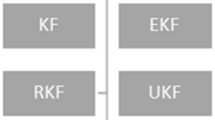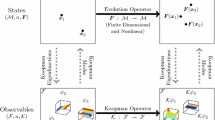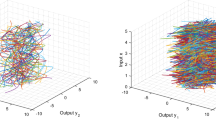Abstract
This paper is concerned with the identification problem for multivariable equation-error systems with autoregressive moving average noise using the hierarchical identification principle and the multi-innovation identification theory. We propose a hierarchical gradient-based iterative (HGI) identification algorithm and give a gradient-based iterative (GI) identification algorithm for comparison. Meanwhile, the multi-innovation theory is used to derive the hierarchical multi-innovation gradient-based iterative (HMIGI) identification algorithm. The analysis shows that the HGI algorithm has smaller computational burden and can give more accurate parameter estimates than the GI algorithm and the HMIGI algorithm can track time-varying parameters. Finally, a simulation example is provided to verify the effectiveness of the proposed algorithms.



Similar content being viewed by others
References
Y. Cao, P. Li, Y. Zhang, Parallel processing algorithm for railway signal fault diagnosis data based on cloud computing. Future Gener. Comput. Syst. 88, 279–283 (2018)
Y. Cao, L.C. Ma, S. Xiao, Standard analysis for transfer delay in CTCS-3. Chin. J. Electron. 26(5), 1057–1063 (2017)
Y. Cao, Y. Wen, X. Meng, Performance evaluation with improved receiver design for asynchronous coordinated multipoint transmissions. Chin. J. Electron. 25(2), 372–378 (2016)
G.Y. Chen, M. Gan, C.L.P. Chen, et al., A regularized variable projection algorithm for separable nonlinear least squares problems. IEEE Trans. Autom. Control, 64(2), (2019). https://doi.org/10.1109/TAC.2018.2838045
G.Y. Chen, M. Gan, F. Ding, et al., Modified Gram-Schmidt method-based variable projection algorithm for separable nonlinear models. IEEE Trans. Neural Netw. Learn. Syst. 2018. https://doi.org/10.1109/TNNLS.2018.2884909
M.Z. Chen, D.Q. Zhu, A workload balanced algorithm for task assignment and path planning of inhomogeneous autonomous underwater vehicle system. IEEE Trans. Cognit. Dev. Syst. (2018). https://doi.org/10.1109/TCDS.2018.2866984
J.L. Ding, The hierarchical iterative identification algorithm for multi-input output-error systems with autoregressive noise. Complexity (2017). https://doi.org/10.1155/2017/5292894
F. Ding, H.B. Chen, L. Xu, A hierarchical least squares identification algorithm for Hammerstein nonlinear systems using the key term separation. J. Frankl. Inst. 355(8), 3737–3752 (2018)
F. Ding, Y.J. Liu, B. Bao, Gradient based and least squares based iterative estimation algorithms for multi-input multi-output systems. Proc. Inst. Mech. Eng. Part I J. Syst. Control Eng 226(1), 43–55 (2012)
F. Ding, X.P. Liu, G. Liu, Gradient based and least-squares based iterative identification methods for OE and OEMA systems. Digit. Signal Process. 20(3), 664–677 (2010)
M. Gan, C.L.P. Chen, G.Y. Chen et al., On some separated algorithms for separable nonlinear squares problems. IEEE Trans. Cybern. 48(10), 2866–2874 (2018)
M. Gan, H.X. Li, H. Peng, A variable projection approach for efficient estimation of RBF-ARX model. IEEE Trans. Cybern. 45(3), 462–471 (2015)
Z.W. Ge, F. Ding, L. Xu et al., Gradient-based iterative identification method for multivariate equation-error autoregressive moving average systems using the decomposition technique. J. Frankl. Inst. 356, 1–19 (2019). https://doi.org/10.1016/j.jfranklin.2018.12.002
F.Z. Geng, S.P. Qian, An optimal reproducing kernel method for linear nonlocal boundary value problems. Appl. Math. Lett. 77, 49–56 (2018)
P.C. Gong, W.Q. Wang, F.C. Li et al., Sparsity-aware transmit beamspace design for FDA-MIMO radar. Signal Process. 144, 99–103 (2018)
Y. Gu. F. Ding, J.H. Li, States based iterative parameter estimation for a state space model with multi-state delays using decomposition. Signal Process. 106, 294–300 (2015)
Y. Gu, J. Liu, X. Li et al., State space model identification of multirate processes with time-delay using the expectation maximization. J. Frankl. Inst. 356, 1–17 (2019). https://doi.org/10.1016/j.jfranklin.2018.08.030
M.H. Li, X.M. Liu, The least squares based iterative algorithms for parameter estimation of a bilinear system with autoregressive noise using the data filtering technique. Signal Process. 147, 23–34 (2018)
M.H. Li, X.M. Liu, Auxiliary model based least squares iterative algorithms for parameter estimation of bilinear systems using interval-varying measurements. IEEE Access 6, 21518–21529 (2018)
X.Y. Li, B.Y. Wu, A new reproducing kernel collocation method for nonlocal fractional boundary value problems with non-smooth solutions. Appl. Math. Lett. 86, 194–199 (2018)
Y. Li, W.H. Zhang, X.K. Liu, H-index for discrete-time stochastic systems with Markovian jump and multiplicative noise. Automatica 90, 286–293 (2018)
Q.Y. Liu, F. Ding, Auxiliary model-based recursive generalized least squares algorithm for multivariate output-error autoregressive systems using the data filtering. Circuits Syst. Signal Process. 38, 1–21 (2019). https://doi.org/10.1007/s00034-018-0871-z
S.Y. Liu, F. Ding, T. Hayat, Hierarchical principle-based iterative parameter estimation algorithm for dual-frequency signals. Circuits Syst. Signal Process. 38, 1–18 (2019). https://doi.org/10.1007/s00034-018-1015-1
X. Li, D.Q. Zhu, An adaptive SOM neural network method for distributed formation control of a group of AUVs. IEEE Trans. Ind. Electron. 65(10), 8260–8270 (2018)
P. Ma, F. Ding, Q.M. Zhu, Decomposition-based recursive least squares identification methods for multivariate pseudolinear systems using the multi-innovation. Int. J. Syst. Sci. 49(5), 920–928 (2018)
J. Na, M.N. Mahyuddin, G. Herrmann, Robust adaptive finite-time parameter estimation and control for robotic systems. Int. J. Robust Nonlinear Control 25(16), 3045–3071 (2015)
P.V. Oversehee, B.D. Moor, Continuous-time frequency domain subspace system identification. Signal Process. 52(2), 179–194 (1996)
J. Pan, X. Jiang, X.K. Wan, A filtering based multi-innovation extended stochastic gradient algorithm for multivariable control systems. Int. J. Control Autom. Syst. 15(3), 1189–1197 (2017)
J. Pan, W. Li, H.P. Zhang, Control algorithms of magnetic suspension systems based on the improved double exponential reaching law of sliding mode control. Int. J. Control Autom. Syst. 16(6), 2878–2887 (2018)
J. Pan, H. Ma, X. Jiang, et al., Adaptive gradient-based iterative algorithm for multivariate controlled autoregressive moving average systems using the data filtering technique. Complexity (2018). https://doi.org/10.1155/2018/9598307
Z.H. Rao, C.Y. Zeng, M.H. Wu, Research on a handwritten character recognition algorithm based on an extended nonlinear Kernel residual network. KSII Trans. Internet Inf. Syst. 12(1), 413–435 (2018)
M. Verhaegen, Identification of the deterministic part of MIMO state space models given in innovations form from input-output data. Automatica 30(1), 61–74 (1994)
D.Q. Wang, Hierarchical parameter estimation for a class of MIMO Hammerstein systems based on the reframed models. Appl. Math. Lett. 57, 13–19 (2016)
D.Q. Wang, F. Ding, Parameter estimation algorithms for multivariable Hammerstein CARMA systems. Inf. Sci. 355, 237–248 (2016)
Y.J. Wang, F. Ding, Novel data filtering based parameter identification for multiple-input multiple-output systems using the auxiliary model. Automatica 71, 308–313 (2016)
Y.J. Wang, F. Ding, A filtering based multi-innovation gradient estimation algorithm and performance analysis for nonlinear dynamical systems. IMA J. Appl. Math. 82(6), 1171–1191 (2017)
D.Q. Wang, L.W. Li, Y. Ji et al., Model recovery for Hammerstein systems using the auxiliary model based orthogonal matching pursuit method. Appl. Math. Modell. 54, 537–550 (2018)
D.Q. Wang, H.B. Liu et al., Highly efficient identification methods for dual-rate Hammerstein systems. IEEE Trans. Control Syst. Technol. 23(5), 1952–1960 (2015)
Y. Wang, Y. Si, B. Huang, S.X. Ding, Survey on the theoretical research and engineering applications of multivariate statistics process monitoring algorithms: 2008–2017. Can. J. Chem. Eng. 96(10), 2073–2085 (2018)
D.Q. Wang, Y.R. Yan, Y.J. Liu et al., Model recovery for Hammerstein systems using the hierarchical orthogonal matching pursuit method. J. Comput. Appl. Math. 345, 135–145 (2019)
D.Q. Wang, Z. Zhang, B.Q. Xue, Decoupled parameter estimation methods for Hammerstein systems by using filtering technique. IEEE Access 6(1), 66612–66620 (2018)
L. Xu, The parameter estimation algorithms based on the dynamical response measurement data. Adv. Mech. Eng. 9(11), 1–12 (2017). https://doi.org/10.1177/1687814017730003
L. Xu, F. Ding, Recursive least squares and multi-innovation stochastic gradient parameter estimation methods for signal modeling. Circuits Syst. Signal Process. 36(4), 1735–1753 (2017)
L. Xu, F. Ding, Iterative parameter estimation for signal models based on measured data. Circuits Syst. Signal Process 37(7), 3046–3069 (2018)
L. Xu, F. Ding, Parameter estimation for control systems based on impulse responses. Int. J. Control Autom. Syst. 15(6), 2471–2479 (2017)
L. Xu, F. Ding, The parameter estimation algorithms for dynamical response signals based on the multi-innovation theory and the hierarchical principle. IET Signal Process. 11(2), 228–237 (2017)
L. Xu, F. Ding, Y. Gu et al., A multi-innovation state and parameter estimation algorithm for a state space system with d-step state-delay. Signal Process. 140, 97–103 (2017)
H. Xu, F. Ding, E.F. Yang, Modeling a nonlinear process using the exponential autoregressive time series model. Nonlinear Dyn. 1–14 (2019). https://doi.org/10.1007/s11071-018-4677-0
G.H. Xu, Y. Shekofteh, A. Akgul et al., A new chaotic system with a self-excited attractor: Entropy measurement, signal encryption, and parameter estimation. Entropy 20(2), 1–23 (2018). https://doi.org/10.3390/e20020086
L. Xu, W.L. Xiong, A. Alsaedi et al., Hierarchical parameter estimation for the frequency response based on the dynamical window data. Int. J. Control Autom. Syst. 16(4), 1756–1764 (2018)
Y.Z. Zhang, Y. Cao, Y.H. Wen et al., Optimization of information interaction protocols in cooperative vehicle-infrastructure systems. Chin. J. Electron. 27(2), 439–444 (2018)
X. Zhang, F. Ding, F.E. Alsaadi et al., Recursive parameter identification of the dynamical models for bilinear state space systems. Nonlinear Dyn. 89(4), 2415–2429 (2017)
X. Zhang, F. Ding, L. Xu et al., State filtering-based least squares parameter estimation for bilinear systems using the hierarchical identification principle. IET Control Theory Appl. 12(12), 1704–1713 (2018)
S. Zhang, D.Q. Wang, F. Liu, Separate block-based parameter estimation method for Hammerstein systems. R. Soc. Open Sci. 5(6), (2018). https://doi.org/10.1098/rsos.172194
X. Zhang, L. Xu, F. Ding et al., Combined state and parameter estimation for a bilinear state space system with moving average noise. J. Frankl. Inst. 355(6), 3079–3103 (2018)
W.H. Zhang, L. Xue, X. Jiang, Global stabilization for a class of stochastic nonlinear systems with SISS-like conditions and time delay. Int. J. Robust Nonlinear Control 28(13), 3909–3926 (2018)
N. Zhao, R. Liu, Y. Chen et al., Contract design for relay incentive mechanism under dual asymmetric information in cooperative networks. Wireless Netw. 24(8), 3029–3044 (2018)
D. Zhao, Y. Wang, Y. Li, S.X. Ding, H-infinity fault estimation for two-dimensional linear discrete time-varying systems based on Krein space method. IEEE Trans. Syst. Man Cybern.-Syst. 48(12), 2070–2079 (2018)
L.C. Zhou, X.L. Li, L.J. Shen et al., Hierarchical recursive least squares parameter estimation of non-uniformly sampled Hammerstein nonlinear systems based on Kalman filter. J. Frankl. Inst. 354(10), 4231–4236 (2017)
L.C. Zhou, X.L. Li, H.G. Xu et al., Multi-innovation stochastic gradient method for harmonic modelling of power signals. IET Signal Process. 10(7), 737–742 (2016)
Z.P. Zhou, X.F. Liu, State and fault estimation of sandwich systems with hysteresis. Int. J. Robust Nonlinear Control 28(13), 3974–3986 (2018)
Acknowledgements
This work was supported by the National Natural Science Foundation of China (Nos. 61873111, 61803049), the Natural Science Foundation of Shandong Province (ZR201702170236) and the Natural Science Fundamental Research Project of Colleges and Universities in Jiangsu Province (No. 17KJB120001).
Author information
Authors and Affiliations
Corresponding authors
Additional information
Publisher's Note
Springer Nature remains neutral with regard to jurisdictional claims in published maps and institutional affiliations.
Rights and permissions
About this article
Cite this article
Wan, L., Ding, F. Decomposition- and Gradient-Based Iterative Identification Algorithms for Multivariable Systems Using the Multi-innovation Theory. Circuits Syst Signal Process 38, 2971–2991 (2019). https://doi.org/10.1007/s00034-018-1014-2
Received:
Revised:
Accepted:
Published:
Issue Date:
DOI: https://doi.org/10.1007/s00034-018-1014-2




